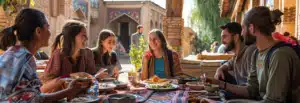In Uzbekistan, gastronomy is no joke. Here, every dish has a story, every ingredient an ancestor, and every meal is a ceremony halfway between an Orthodox mass and a drunken family reunion. If you thought rice was bland or meat only one colour, wait until you dip your fork into a steaming plov or bite into a crispy samsa. Imagine a country where the cuisine is as rich as the mosaics of Samarkand, as generous as the smiles of the bazaars, and as spicy as the stories of the caravans on the Silk Road. Uzbekistan isn't just a journey for the eyes: it's an open-air sensory buffet, a gustatory orgy between steppes and minarets. And the best part? You can not only wax lyrical about it, but experience it for real, thanks to local agencies like Sarbon TourYou'll be able to choose from a wide range of itineraries. Between two visits to medersas, there's a little lagman for the road. That's Uzbekistan for you: walk, eat, marvel and eat again. So strap your towels around your necks and let's explore the map - the dishes as much as the landscapes. And don't be surprised if you come back with a few well-placed kilos of happiness.
Plov: the king of Uzbek dishes
Plov is the patriarch of the Uzbek culinary family. He sits on the table like a respectable grandfather, surrounded by his grandchildren, the vegetables, his daughter-in-law, the meat, and his distant cousins, the spices. It's not just rice, though - it's the rice who's been to military school, who knows how to behave, and who brings back memories of ancestors you don't even have.
Prepared in a large kazan (a round pot that could easily house an entire campfire), plov is a noble and rustic mixture of rice, julienned carrots, melting onions and meat - often mutton or beef, sometimes both, as a successful compromise between two schools of cooking. The whole thing simmers until the grains of rice become little sponges of flavour, soaked in the happy fat of the meat and the caramelised sugar of the carrots. Is it greasy? Yes. Is it heavy? Absolutely. Does it make you want more? Without hesitation.
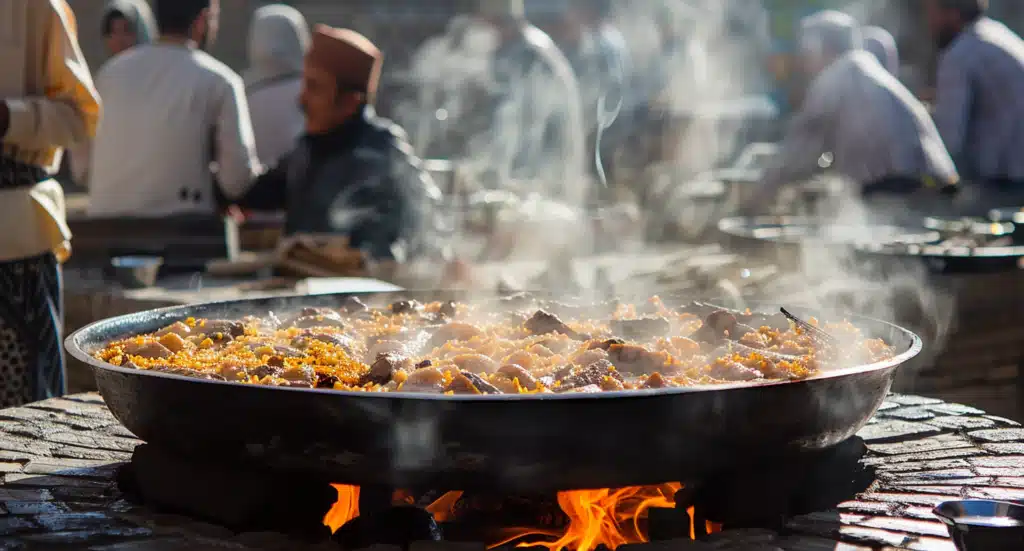
Manty: steamed ravioli better than in Italy
Manty are the little gift packages of Uzbek cuisine. They look like Central Asian dumplings that have passed through a Miss Charm contest and won hands down. A thin pastry, folded like a gourmet origami, encloses a generous filling: minced meat, onions, sometimes a hint of fat for the purists - all steamed in a couscous stage that's more sophisticated than it looks.
Tender and juicy, they can be eaten by the dozen without blinking an eye. They're served with a drizzle of vinegar or a spoonful of yoghurt, to add a little pep to an already soulful bite. And if you're lucky enough to taste them homemade, like I did in Bukhara, you can expect a free masterclass in hand-folding. The granny who taught me was still laughing when she saw my first attempt turn into a living pancake. The moral? Manty is the culinary hug you never knew you needed. And it's also an opportunity to get your hands dirty in the batter, between two laughs and three glasses of green tea.
Samarkand bread with a love story
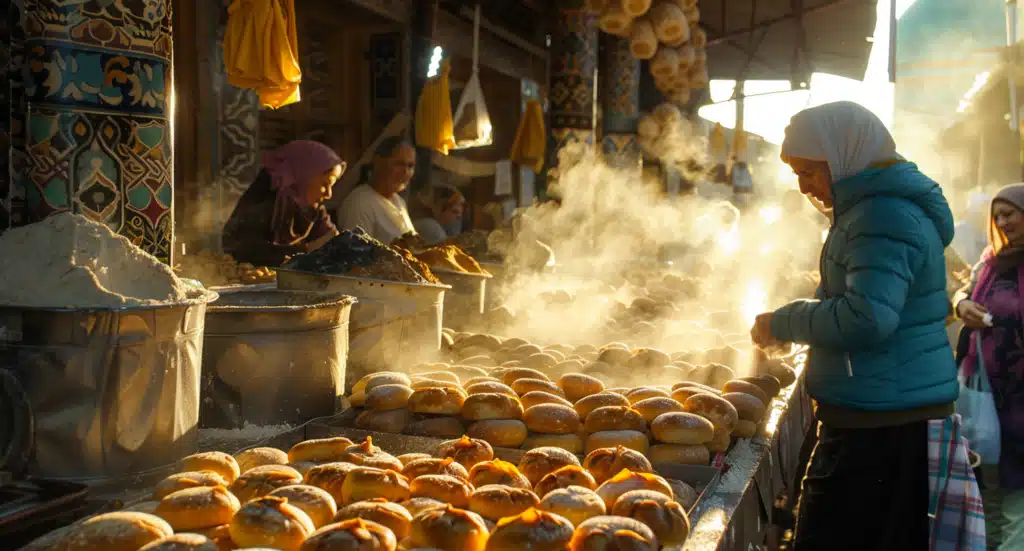
If Uzbekistan had a logo, it would probably be a loaf of 'non' - that round, golden, flat bread baked in a hot clay oven, with a delicately stamped centre. It's crispy on the outside, soft on the inside, and above all, it smells of home, patience, and the desire to rip life to shreds.
This bread is so sacred that some people never put it down face down. It is sold in the bazaars in stacks as high as ramparts, and is eaten with everything: plov, soup, tea, and sometimes even on its own, just because it is irresistible. And then there's the famous legend - that of the Emir of Bukhara, who, fascinated by the bread of Samarkand, brought a baker to his city to reproduce it. In vain. The bread didn't taste the same. The air of Samarkand, it was said, was the missing ingredient. Beautiful, isn't it? A bread with the breath of the land. I brought back three. They didn't make it past the taste frontier on the plane. They all disappeared in the taxi.
Lagman: the spaghetti that made boxing
Lagman is like a noodle dish that's taken kung fu lessons in the mountains. Forget the pale linguine from the local trattoria: here, the pasta is thick, hand-pulled with the vigour of a Shaolin monk on flour, then plunged into a glowing broth infused with spices, crunchy vegetables and tender meat. It is said that each region of Uzbekistan has its own version of lagman, like a football team with its own tactics, sauce secrets and preference for radishes. In Tashkent, I discovered an almost incantatory lagman, so spicy that it warmed my childhood memories. An old man told me, between two mouthfuls, that "real lagman must sting as much as a memory of an ex-girlfriend". We're not joking here. This dish is often served in deep, almost ceremonial bowls, and is eaten with a spoon. and with a fork. You struggle a bit at first, but you always win in the end. And then, let's be honest: when a noodle soup makes you cry with happiness and capsaicin, it's because it's told you something.
Shashlik: the wild steppes version of barbecue
Shashlik is the illegitimate child of a Turkish kebab and a Texan barbecue, raised on the plains of Central Asia with a passion for marinade and charcoal. These skewers of meat, usually lamb, are marinated in a mixture of onions, spices and grandma's secrets, then grilled over hot coals until they are so beautifully crispy that you hesitate to eat them for fear of ruining them (well, not for long).
The scent of shashlik wafts through the streets like an ancient call. When I arrived in Khiva, I followed the smell like a mouse guided by an invisible cheese. The result: I landed in front of a stall where a young guy, shirtless and with a conquering moustache, was flipping kebabs as if he were negotiating a peace treaty. And I'll tell you without shame: they were the best mouthfuls of meat of my life. Tender, juicy, crispy around the edges, with that little hint of smoke that lingers on your tongue like a slightly serious love song. And between you and me, it's always accompanied by raw onions. Because that's what Uzbekistan is all about: daring combinations. And fiery breath.
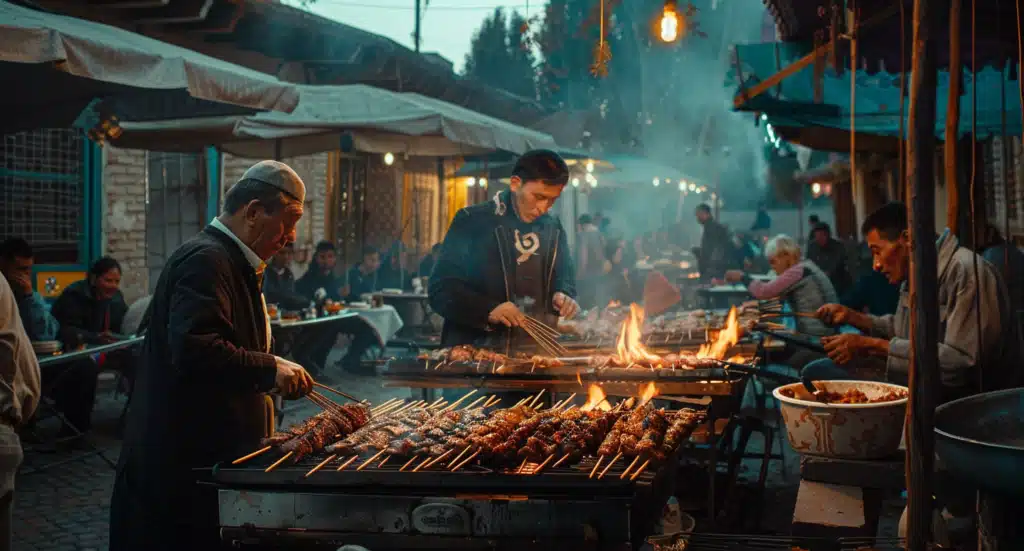
Dimlama: the simmering Sunday dish
Ah, dimlama. A name that smells of Sunday mornings, woollen slippers and the smell of stew that wakes you even before you wake up. Dimlama is a family stew, a sort of stew that has crossed the steppe on a donkey. It's made up of skilfully stacked layers: meat, potatoes, onions, peppers, carrots, sometimes even quinces, all slow-cooked in a large casserole dish to make it as soft as an old jumper. What makes dimlama irresistible is its universal tenderness. It doesn't knock you out like a lagman or a plov; no, it cradles you. He says: "Come on, you've done enough running, settle down, have some sauce, breathe". In Ferghana, I shared a dimlama in a village house where the dish was placed in the centre of the table, and everyone served themselves with their hands. It was sweet, warm, and the discussions ranged from horoscopes to the story of Genghis Khan. A stew that brings people together is rare. Over there, the dimlama is a bit like a grandmother: he doesn't say much, but he's good for you.
Why not try it for real?
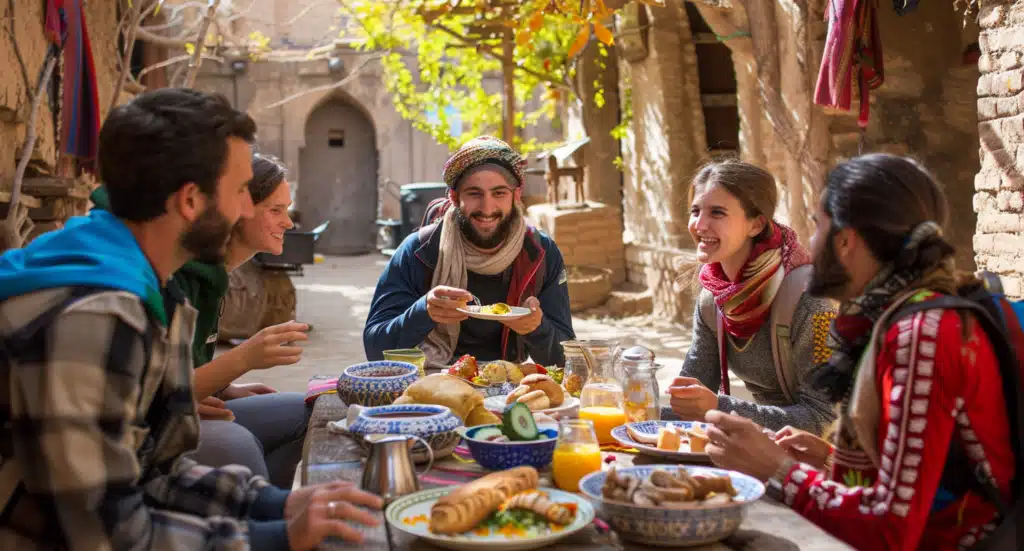
Because reading is good, but chewing is better: to experience this culinary odyssey from the inside (and lose a few trouser buttons in the process), I can only recommend the tours of Sarbon Tour. This Uzbek agency offers tailor-made trips - literally and figuratively.
Their secret? An intimate knowledge of the country, passionate guides and, above all, a real emphasis on gastronomy. With them, you don't just visit mosques and take photos of ceramics: you tastes culture. You cook with local families, eat in the bazaars, share tea with an imam who has a weakness for manty, and discover corners where even Google Maps barely dares to venture.
And the best part? They make you feel at home, at the end of the world. In Uzbekistan, you don't travel. You're part of the party.
Eat, Pray, Love... in Uzbek
In Uzbekistan, food is more than just fuel. It's a philosophy, an art of living, a way of saying "welcome", "thank you" and sometimes even "I love you" without opening your mouth - just by holding out a well-stocked plate. So if you want to discover a country through its taste buds, between two medersas and three flying carpets, come. Eat. Laugh. And let yourself go. Because at the end of the day, the real journey may just be a good meal shared with strangers who become family. More information on our Uzbekistan destination page and on the Sarbon Tour.






